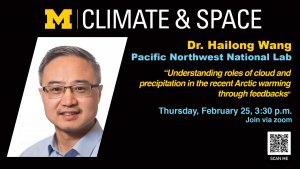Presented By: Climate and Space Sciences and Engineering
CLASP Seminar Series: Dr. Hailong Wang

Dr. Hailong Wang of the Pacific Northwest Laboratory will give a virtual lecture as part of the CLASP Seminar Series. Please join us!
This is a Zoom virtual event.
https://umich.zoom.us/j/94897438456?pwd=S3h5VWxEWVhhVmRNSTEzVUt6Yyt2Zz09
Meeting ID: 948 9743 8456
Passcode: 192897
"Understanding roles of cloud and precipitation in the recent Arctic warming through radiative feedbacks"
Abstract:
Since the early 1980s, the Arctic has warmed 2-3 times faster than the global mean, a feature often called Arctic amplification (AA). As the Arctic warms, the melt of snow and ice together with the associated feedbacks is known to be an important reason for AA. According to our feedback estimates from historical climate model simulations and reanalysis datasets, much of the amplified Arctic warming can be attributed to the surface albedo feedback. In a recent study, we used results from a global climate model and multiple reanalysis datasets to unravel the causes of a 1% per decade absolute reduction in the Arctic surface albedo, as revealed by satellite observations. We found that reductions of terrestrial snow cover, snow cover fraction over sea ice, and sea ice extent appear to contribute equally to the Arctic albedo decline. Further analysis of the global model results showed that the decrease in snow cover fraction is primarily driven by the increase in surface air temperature, followed by declining snowfall. Although the total precipitation has increased as the Arctic warms in the recent decades, Arctic snowfall has decreased substantially in all of the analyzed datasets. While CMIP6 models agree well on the importance of surface albedo feedback to AA, net cloud feedback over the Arctic has large uncertainties including its sign, which strongly depends on the datasets (e.g., reanalysis, satellite, or climate models), the time periods, and the methods used for the feedback estimation. AMIP6 models with known historical effective radiative forcing give a near-zero global mean cloud feedback for the recent past, leading to a negative global mean net feedback that is about twice the feedback estimated from CMIP6 long‐term warming (4×CO2) experiments.
Please join us!
This is a Zoom virtual event.
https://umich.zoom.us/j/94897438456?pwd=S3h5VWxEWVhhVmRNSTEzVUt6Yyt2Zz09
Meeting ID: 948 9743 8456
Passcode: 192897
"Understanding roles of cloud and precipitation in the recent Arctic warming through radiative feedbacks"
Abstract:
Since the early 1980s, the Arctic has warmed 2-3 times faster than the global mean, a feature often called Arctic amplification (AA). As the Arctic warms, the melt of snow and ice together with the associated feedbacks is known to be an important reason for AA. According to our feedback estimates from historical climate model simulations and reanalysis datasets, much of the amplified Arctic warming can be attributed to the surface albedo feedback. In a recent study, we used results from a global climate model and multiple reanalysis datasets to unravel the causes of a 1% per decade absolute reduction in the Arctic surface albedo, as revealed by satellite observations. We found that reductions of terrestrial snow cover, snow cover fraction over sea ice, and sea ice extent appear to contribute equally to the Arctic albedo decline. Further analysis of the global model results showed that the decrease in snow cover fraction is primarily driven by the increase in surface air temperature, followed by declining snowfall. Although the total precipitation has increased as the Arctic warms in the recent decades, Arctic snowfall has decreased substantially in all of the analyzed datasets. While CMIP6 models agree well on the importance of surface albedo feedback to AA, net cloud feedback over the Arctic has large uncertainties including its sign, which strongly depends on the datasets (e.g., reanalysis, satellite, or climate models), the time periods, and the methods used for the feedback estimation. AMIP6 models with known historical effective radiative forcing give a near-zero global mean cloud feedback for the recent past, leading to a negative global mean net feedback that is about twice the feedback estimated from CMIP6 long‐term warming (4×CO2) experiments.
Please join us!